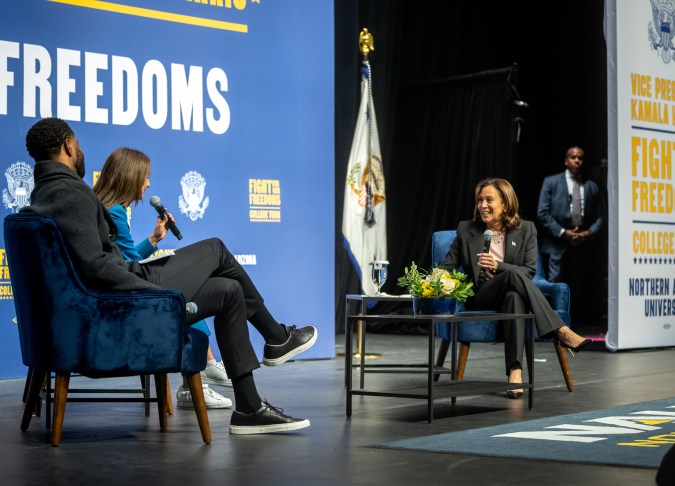With the news surrounding Palestine and Israel only worsening by the day and the long, taxing process of appointing a new Speaker of the House leading to a questionable pick, an overwhelming sense of powerlessness for the average person is inevitable. And that’s just this past month. It’s not even considering the sheer inhumane practices at the Texas border, the continued attacks against DACA, the red tape placed on student loan forgiveness, and the backpeddling on reproductive rights. Again, just to mention a few problems young voters — especially those of immigrant backgrounds, like the Latine communities — face.
When observing the current state of our nation and international affairs, it’s normal to feel discouraged. And yet, as a younger, more diverse generation, fighting the intrusive, doomsday thoughts with active political participation is important. “Elections do matter,” Vice President Kamala Harris tells Remezcla after a meeting with students. “Even when there are people who try to make it difficult for them to vote, they have to figure out and do vote because their vote will actually matter on some of our biggest issues.”
Since September, Vice President Harris has been on the “Fight for Our Freedoms College Tour” throughout the country to encourage students to vote. Remezcla attended her last stop at Northern Arizona University, a “Hispanic-serving institution” in Flagstaff, AZ. There, we had the opportunity to talk to her about some of the freedoms young people are struggling to grasp onto, like reproductive rights, immigration, gun violence, and voting rights.

This focus on voting rights and immigration issues takes on renewed importance in the current political climate. Even though the Trump administration didn’t win a second term, their anti-immigrant rhetoric remains alive and well. Back in August, the Republican party held its second presidential debate, featuring hopefuls former Vice President Mike Pence, Florida Governor Ron DeSantis, and entrepreneur Vivek Ramaswamy, among others. The debate was co-moderated by Univision news anchor Ilia Calderón, who welcomed the Spanish-speaking audience in Spanish. This evoked a racist response towards Calderón, with many conservative social media users calling for making English the U.S.’ official language without room for others.
In the U.S., 42 million people speak Spanish as their first language, and 15 million more speak it as a second language. When bringing up the incident to Vice President Harris, she shakes her head in disagreement.
“The United States is a country that was founded by and has thrived because of immigration. So let’s be clear about that,” she points out. “I have always felt very strongly that for those of us who are in a role of leadership, especially when it comes to informing people about issues and their rights, that we should do it in every language that is necessary to make sure all people are informed and included.”
Though we’re a country of immigrants, and to this day, one that can’t survive without them, regardless of status, political parties can’t seem to agree on the matter. Though former President Trump received backlash for his comments and policies on immigration, the needle hasn’t moved enough toward a solution yet. Like with every administration since the early 2000s, the enforcement at the border has only increased, and Congress has failed to pass any sort of comprehensive immigration reform for those already in the country.
According to the Vice President, the current administration’s immigration policies largely involve undoing the previous one’s work. “We are fighting for a safe, orderly, and humane immigration system. The previous administration just practically destroyed the system,” she says, bringing up the border wall, family separation, and attempts to undo DACA. “When we look at what we have been able to do, to undo a lot of that work, but also to move toward a pathway for citizenship.”
“The United States is a country that was founded by and has thrived because of immigration.”
She brings up The U.S. Citizenship Act, a piece of legislation that aims to “modernize our immigration system” and would create a path to citizenship for undocumented folks. “Republicans are playing politics with this issue,” Vice President Harris says. “I think that they have decided that the image of the chaos is something that helps them, but they are the ones who are actually pushing chaos. We are trying to offer solutions.”
Other solutions that have been met with hostility are those proposed for gun reform. Latine youths are disproportionally affected by gun violence in our country. According to the Centers for Disease Control and Prevention, Wide-ranging Online Data for Epidemiologic Research (WONDER), quoted by Giffords, approximately 11 Hispanics died daily from gun violence from 2016 to 2020. Gun violence is the leading cause of death for boys aged 15 to 19 and the third for men aged 20 to 44.
In a country where news of a new mass shooting is all too frequent, the issue took center stage during the chat with students. Just this year, there have been at least 106 incidents of gunfire on school campuses, resulting in 31 deaths, according to Everytown. “I’m proud that our administration has passed some of the first gun safety legislation in 30 years that has been passed. But we have to do more,” Vice President Harris notes. She points out that we need universal background checks, a ban on assault weapons, and a red flag law.
“The fact is that we once had an assault weapons ban, so it doesn’t have to be this way that it doesn’t exist, but we need people in elected office who actually have the courage to stand up and say, ‘I support the Second Amendment and I support reasonable gun safety laws,’” she adds, referencing how Republican lawmakers have been historically against any steps towards gun reform.
While the Second Amendment is untouchable to some, reproductive rights are fair game, apparently. Last year, the Supreme Court overturned Roe v. Wade, ending the right to abortion we’ve had since 1973. In the last 29 years, the U.S. is one of only four countries that has rolled back abortion rights. In stark contrast, Latin American countries like Colombia, Mexico, and Argentina have recently passed legislation to decriminalize or legalize abortion.
“When we looked at the statistics around Latinas in this subject, we know that there is a great deal of support for the right that people should have to make the decision for themselves, not the government,” the Vice President says. “But also when we’re talking about working women, when we’re talking about women who are low income, what it means in terms of access to resources, especially if they live in a state which has banned their access to reproductive health. Those are some of the areas that we’ve focused on.”
The Vice President mentions that her career has allowed her the opportunity and responsibility to travel the country to talk about reproductive rights and encourage people to organize and use their voices. “I believe that everyone, regardless of their gender, has the ability and the responsibility to speak up on behalf of the importance of the freedom to literally make decisions about your own body,” she says.
Moving away from the heavier topics, as our conversation drew to a close, we had to ask the Vice President if she had any Latine artists on her playlists. “I love many, many artists, so I don’t know if I should even name one,” she says hesitantly. “Well, if I had to name one, but there are many, I’d probably say Bad Bunny.”
And just as Benito once said, ‘el mundo es de él’ — the world is his. Let’s heed that wisdom, continue having important conversations, and register to vote.




